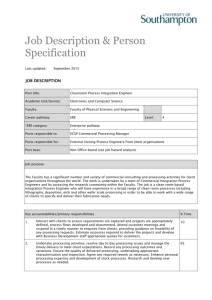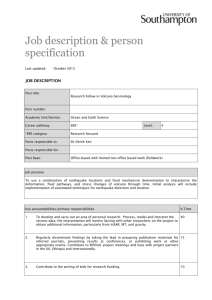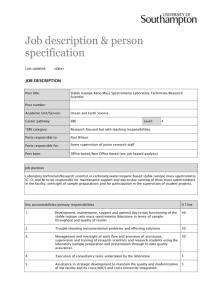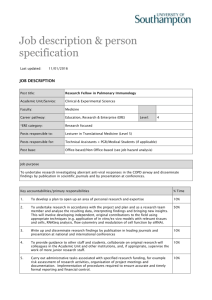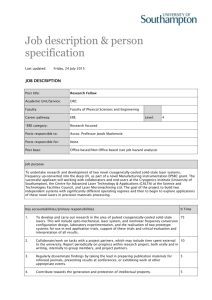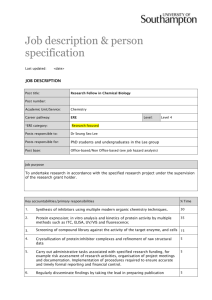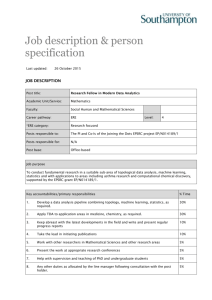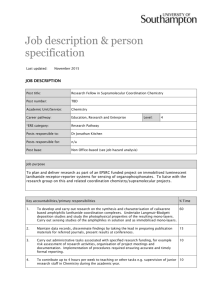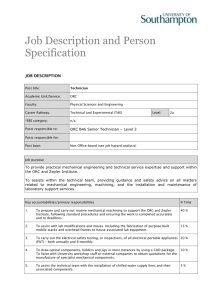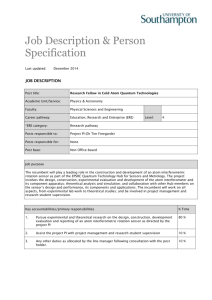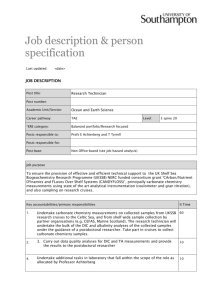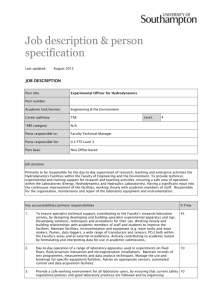Job Description and Person Specification
advertisement
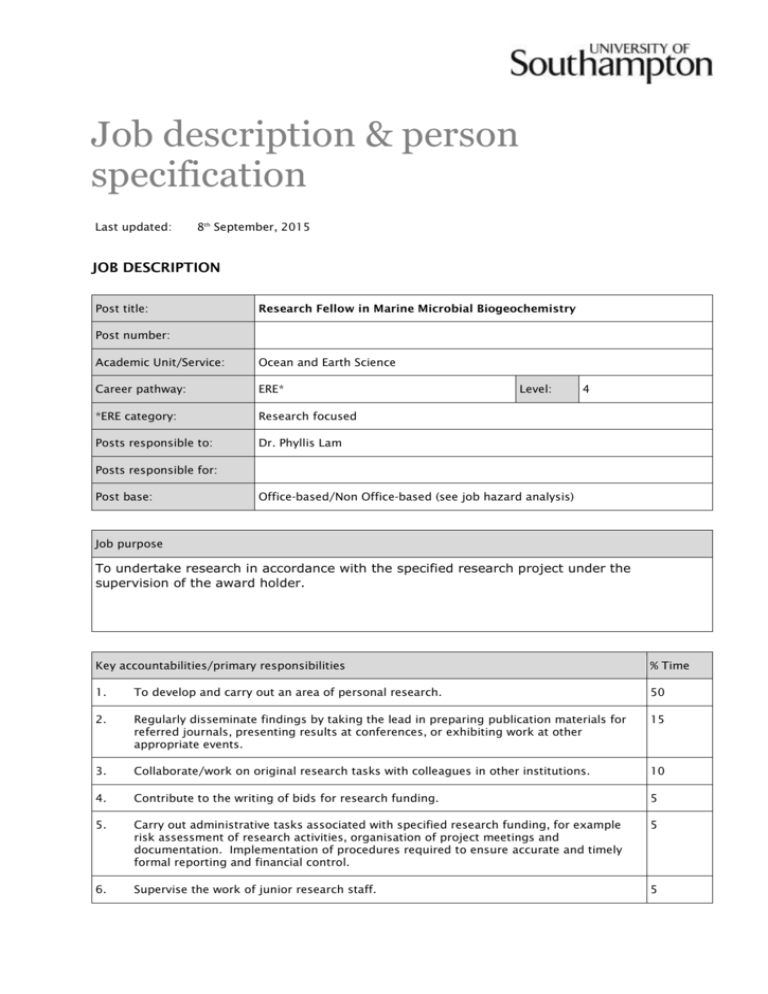
Job description & person specification Last updated: 8th September, 2015 JOB DESCRIPTION Post title: Research Fellow in Marine Microbial Biogeochemistry Post number: Academic Unit/Service: Ocean and Earth Science Career pathway: ERE* *ERE category: Research focused Posts responsible to: Dr. Phyllis Lam Level: 4 Posts responsible for: Post base: Office-based/Non Office-based (see job hazard analysis) Job purpose To undertake research in accordance with the specified research project under the supervision of the award holder. Key accountabilities/primary responsibilities % Time 1. To develop and carry out an area of personal research. 50 2. Regularly disseminate findings by taking the lead in preparing publication materials for referred journals, presenting results at conferences, or exhibiting work at other appropriate events. 15 3. Collaborate/work on original research tasks with colleagues in other institutions. 10 4. Contribute to the writing of bids for research funding. 5 5. Carry out administrative tasks associated with specified research funding, for example risk assessment of research activities, organisation of project meetings and documentation. Implementation of procedures required to ensure accurate and timely formal reporting and financial control. 5 6. Supervise the work of junior research staff. 5 Key accountabilities/primary responsibilities % Time 7. Carry out occasional undergraduate supervision, demonstrating or lecturing duties within own area of expertise, under the direct guidance of a member of departmental academic staff. 5 8. Any other duties as allocated by the line manager following consultation with the post holder. 5 Internal and external relationships (including nature and purpose of relationships) Direct responsibility to holder of research award (Dr Phyllis Lam). The appointee will be expected to work together with other co-investigators on this NERC-funded project, Dr. Tom Bibby (Ocean and Earth Science), Dr. Paul Skipp (Centre for Biological Sciences) and Dr. Andy Rees (Plymouth Marine Laboratory), as well as other project partners from institutions within and outside the UK. The appointee will be expected to work and collaborate with other members of the Marine Biogeochemistry Group and the Institute for Life Sciences at Southampton, as well as at the National Oceanography Centre Southampton. This may include contribution to the supervision of research students within the group. The appointee will also be expected to contribute to outreach activities to communicate our research findings to stakeholders and the general public. PERSON SPECIFICATION Criteria Essential Desirable How to be assessed Qualifications, knowledge & experience PhD or equivalent professional qualifications and experience in Oceanography or other science disciplines with a marine focus Knowledge of marine microbial ecology and molecular biology Application/ interview Detailed understanding and knowledge of marine nitrogen cycling and stable isotope biogeochemistry Teaching at undergraduate level and contributing to teaching at postgraduate level Proven ability to conduct 15N-labeling experiments, GC-IRMS analyses, CARD-FISH, field sampling and experimentation at sea Planning & organising Document1 Able to organise own research activities to deadline and quality standards Interview/ references 2 Problem solving & initiative Able to develop understanding of complex problems and apply indepth knowledge to address them Interview/ references Able to develop original techniques/methods Management & teamwork Able to supervise work of junior research staff, delegating effectively Application/ interview/ references Able to contribute to Academic Unit management and administrative processes Work effectively in a team, understanding the strengths and weaknesses of others to help teamwork development Communicating & influencing Communicate new and complex information effectively, both verbally and in writing, engaging the interest and enthusiasm of the target audience Application/ Interview/ references Able to present research results at group meetings and conferences Able to write up research results for publication in leading peer-viewed journals Work proactively with colleagues in other work areas/institutions, contributing specialist knowledge to achieve outcomes Other skills & behaviours Understanding of relevant Health & Safety issues Interview/ references Positive attitude to colleagues and students Special requirements Able to join fieldwork campaigns (ca. 1-6 weeks) at sea. Interview Occasionally travel to project partner institutions for sample analyses and discussions. Able to attend national and international conferences to present research results. Document1 3 JOB HAZARD ANALYSIS OFFICE-BASED POST If this post is an office-based job with routine office hazards (eg: use of VDU) no further information needs to be supplied. NON-OFFICE BASED POST If this post has some hazards other than routine office (eg: more than use of VDU) please complete the analysis below. ## - HR will send a full PEHQ to all applicants for this position. ENVIRONMENTAL EXPOSURES Occasionally Frequently Constantly (<30% of time) (30-60% of time) (> 60% of time) Outside work √ Extremes of temperature (eg: fridge/ furnace) √ ## Potential for exposure to body fluids n/a n/a n/a ## Noise (greater than 80 dba - 8 hrs twa) n/a n/a n/a ## Exposure to hazardous substances (eg: solvents, liquids, dust, fumes, biohazards). Specify below: √ Use of various solvents and toxic chemicals associated with stable isotope analyses and cell fixation (e.g. ethanol, liquid nitrogen, mercuric chloride, paraformaldehyde) Frequent hand washing Ionising radiation √ n/a n/a n/a ## Food handling n/a n/a n/a ## Driving university vehicles(eg: car/van/LGV/PCV) n/a n/a n/a ## Use of latex gloves (prohibited unless specific clinical necessity) n/a n/a n/a ## Vibrating tools (eg: strimmers, hammer drill, lawnmowers) n/a n/a n/a EQUIPMENT/TOOLS/MACHINES USED PHYSICAL ABILITIES Load manual handling √ Repetitive crouching/kneeling/stooping √ Repetitive pulling/pushing √ Repetitive lifting √ Standing for prolonged periods √ Repetitive climbing (ie: steps, stools, ladders, stairs) √ Fine motor grips (eg: pipetting) √ Gross motor grips √ Repetitive reaching below shoulder height √ Repetitive reaching at shoulder height √ Repetitive reaching above shoulder height √ PSYCHOSOCIAL ISSUES Face to face contact with public √ Lone working ## Shift work/night work/on call duties Document1 √ n/a n/a n/a 4
